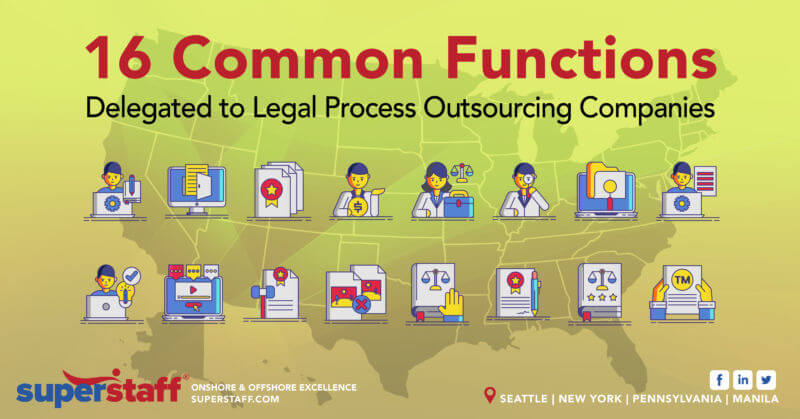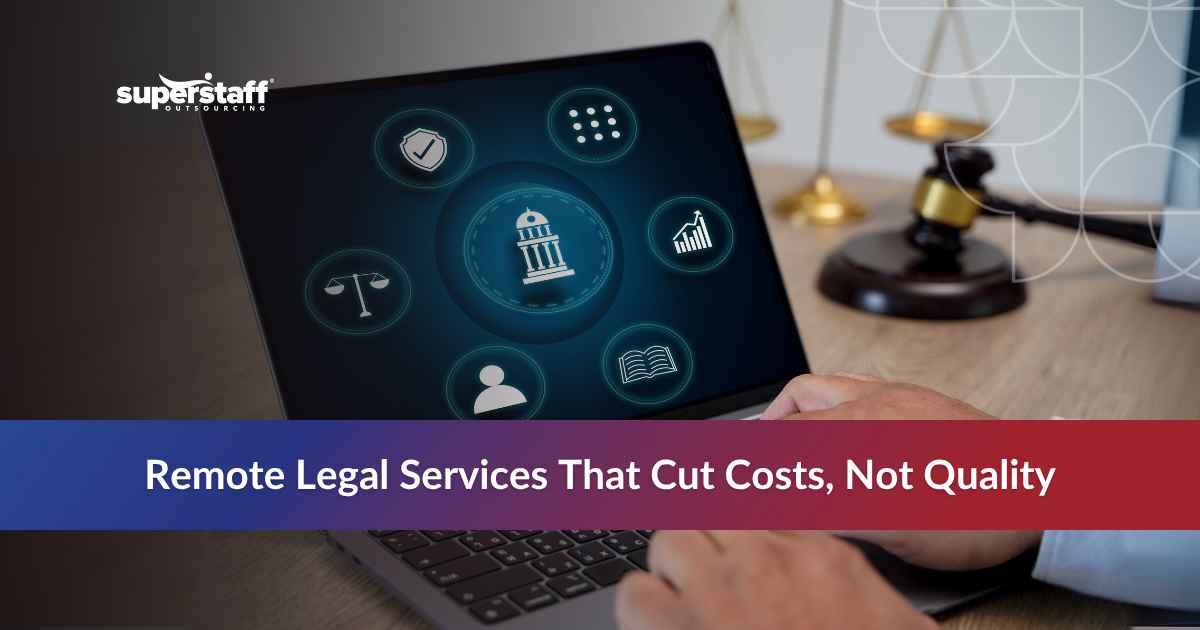
Industry analysts expect the global legal services market to reach a market size of $750 billion as it recovers from the effects of the pandemic. The positive trend is attributed to the sectors’ growing openness to innovation and adoption of breakthrough business models, including legal process outsourcing.
What Is Legal Process Outsourcing (LPO)?
Running a law firm or a corporate legal department comes with a plethora of time-consuming tasks. Legal process outsourcing is the practice of hiring the services of an external company to perform some of the functions integral to running a law firm or corporate legal department. Legal outsourcing services fall under knowledge process outsourcing (KPO), a subset of BPO that involves outsourcing highly skilled, specialized, and analytical functions.
Which Legal Services to Outsource
Determining which legal services to outsource involves the assessment of your core and non-core functions.
Core functions are your areas of expertise, such as legal representation and consultation. On the other hand, non-core functions are crucial supporting activities that do not directly produce revenues, such as research and record keeping. Most core functions require the completion of non-core tasks.
You can delegate the majority of non-core functions to a legal outsourcing services provider. This strategy enables your business or firm to focus energy and resources on areas where you have a competitive advantage.
16 Most Common Functions Delegated to Legal Process Outsourcing Companies
Administrative Support
#1: Data Extraction and Entry
While slowly adopting digitalization, the law industry is still largely paper-dependent. To make data access more efficient, law firms and companies perform data entry and extraction.
Legal data entry involves converting written or printed documents into digital format by manually typing or through automated means. On the other hand, data extraction involves getting important data from legal documents, such as contracts.
Since these functions are both laborious and time-consuming, they are often assigned to legal outsourcing services providers.
#2: Electronic Document Management
Electronic document management is the systematic receiving, sending, storing, or exchanging documents through digital means. This process requires robust software to facilitate the reproduction and management of documents into all digital formats. If your business or firm lacks such technical competencies, it is ideal to entrust this service to a legal process outsourcing provider.
#3: Secretarial Services
Law firms and legal departments never run out of clerical tasks. From scheduling appointments to ensuring that administrative operations run smoothly, the functions of a legal secretary are diverse.
Most of these functions can be carried out remotely, making it one of the ideal functions to delegate to a legal process outsourcing company. This move enables your firm or business to reduce major expenses for occupying a physical office while allowing flexible service delivery.
#4: Billing Services
Calculating billable hours is one of the most popular billing best practices in the legal profession and has also been practiced for years. It is also one of the non-billable tasks that consume a lot of legal practitioners’ time.
According to a report, the average billable hours charged by lawyers in 2020 was only 2.5 hours per day. The rest goes to non-billable functions, including invoicing and other billing-related tasks.
Some of the benefits you can get from assigning your billing tasks to a legal outsourcing service partner are as follows:
- Improve collection timelines
- Enhance cash flow
- Free up more time for billable activities
- Improve customer service
#5: Paralegal Services
In a highly competitive and demanding legal industry, paralegals provide the support to ensure that legal team members are well prepared for every case. From performing legal research to contacting clients, paralegals perform a myriad of tasks crucial to a firm’s success. Law firms and corporations procure paralegal services from legal process outsourcing companies to expedite and improve the quality of service, among many other benefits.
#6: Document Discovery
Both the defense and the prosecution teams are required by the courts to disclose the evidence and documents they hold relevant to the case. Document discovery is the process of gathering legal evidence when filing a lawsuit. This process includes:
- Finding documents that can be used as evidence or to support the case
- Verifying the authenticity of the documents
- Handling the legal procedures and fulfilling requirements related to gaining access to the documents
With the enormous volume of documents produced by companies, document discovery can be extremely costly and time-consuming. Outsourcing this service enables firms to leverage the legal outsourcing service provider’s technology and dedicated workforce to help expedite the process.
#7: E-Discovery Compliance
E-discovery is researching virtual or electronic data, such as social media and email exchanges, to use as evidence. Just like document discovery, e-discovery must be disclosed to both parties if they are to be used as evidence to pursue litigation.
With the world creating an average of 2.5 quintillion bytes of data daily, performing this task can be a challenging ordeal without the aid of the latest technologies and expert data scientists. It is best to acquire it from legal process outsourcing with access to such resources.
#8: Database Creation and Maintenance
Database creation is the process of creating an organized collection of data for easy retrieval and sharing. On the other hand, database maintenance involves performing routines to optimize the database’s security and performance, such as:
- Freeing up disk space
- Identifying data discrepancies
- Updating statistics
- Deleting obsolete data
- Checking hardware issues
Designing a database alone ranges between $2,000 to $500,000, depending on the size and complexity of the project. Companies that acquire database creation and management from legal outsourcing services providers save a significant amount of money.

Intellectual Property
#9: Patent Drafting and Review
Patent drafting is necessary to apply for a patent for an original idea, product, or invention. It involves writing a detailed description of your product or idea to convince governing bodies that what you want to patent is original. On the other hand, a patent review evaluates an intellectual property to determine if it should be submitted for patent applications.
The patent application document does not only have to be well-written. According to the law, the description must be understood by someone unfamiliar with what you wanted to be patented. Additionally, all critical parts of the written document must be complete and meet formatting guidelines, such as character counts.
The intricacy of these processes requires professionals who specialize in these fields. If these areas are not your expertise, it is best to leave them to legal process outsourcers.
#10: IP Portfolio Management
Your trademarks, brands, patents, and other intellectual properties are among the most valuable assets of your company. Engaging legal process outsourcing professionals in this process will help prevent IP infringement and other issues that may arise from mismanagement.
#11: Patent Proofing and Docketing
It is imperative for every patent document to be error-free, whether it is to be submitted for application or release. That is why patent proofing is one of the popular legal outsourcing services among businesses and legal firms. This is the method of identifying and correcting errors in patent documents according to set parameters and methodology.
On the other hand, patent docketing is a method used ito manage patent applications and ensure that the deadlines in submitting required documents are met.
Both patent proofing and docketing require specialized sets of skills and strict attention to detail. If your corporation or firm handles multiple applications, engaging a legal process outsourcing provider will help your firm have a dedicated team to focus on such tasks.
#12: Cease and Desist Notices
These documents are legal orders used to stop any activity or operation suspected or proven to be illegal, such as intellectual property infringement. Since cease-and-desist orders are used in many areas of the law, their requirements and formats also vary according to use. Assigning this task to a knowledgeable legal outsourcing service professional will save your core team a significant amount of time in research, writing, editing, and proofreading.
Contracting Support
#13: Contract Due Diligence
Due diligence is a legal concept that involves the thorough review and inspection of a contract. It aims to ensure that everything in the document is correct, factual, and complete before entering the transaction. If the contract review tasks block off your core team’s calendar, consider turning the function over to a legal outsourcing services provider.
#14: Contract Management
Drafting a contract alone goes through many complex and thorough processes. But the works involved in a contract do not end after it is finalized and signed. This reality is the reason why contract management is best left to a reputable legal process outsourcing provider.
Contract management involves:
- Ensuring that you can perform your duties equally
- Ensuring that you are getting the benefits set aside for you according to the contract
- Documenting revisions and updates made to the contract
- Documenting versions of the contract
Legal Research and Analysis
#15: Statutory or Case Law Research
Statutory laws are laws authored by either the state or federal legislature. On the other hand, case laws are laws created by judiciary systems, either the court or judge.
If you run a law firm that handles cases from different districts and locations, it is best to delegate these law research tasks to a legal outsourcing services company. Not only will this speed up the process, but the research results will also be more in-depth as there will be delegated professionals who can only focus on research for your case.
#16: Legal Coding and Indexing
Legal coding and indexing are essential steps to building an efficient and organized document database. Coding involves creating keyword data or a summary for each document. Indexing is the process of categorizing legal articles according to dates, title, authors, etc.
The complex nature of these jobs requires one to invest a tremendous amount of time. Suppose you don’t have the expertise in these areas or don’t have the availability to allow dedicated time for this process. In that case, your best option is to tap a legal process outsourcing provider.
When to Outsource Legal Services
To know if it’s time to outsource non-core functions to a legal outsourcing service provider, consider the following factors:
- Are there specific areas in your operation that are taking most of your time and resources?
- Does your firm or legal department often have challenges responding to the unforeseen rises in the volume of tasks?
- Do you often have a backlog of unprocessed documents for data entry and extraction?
- Does your internal team often have to render overtime to perform administrative duties?
- Are you having challenges meeting deadlines?
If you answer “yes” to any or all of the questions above, it is time to employ legal process outsourcing as a strategy.
Where to Outsource Legal Services
Once you have determined what and when to outsource, the next—and perhaps most crucial —step is knowing where to outsource. The success of your legal process outsourcing initiative relies greatly on how rewarding the partnership is with your chosen legal service outsourcing partner.
When weighing your options, perform due diligence and consider the following factors based on the guidelines of the American Bar Association:
- Do the legal process outsourcing professionals have enough qualifications to perform the job?
- Is the legal outsourcing service provider capable of providing adequate supervision from a qualified mentor?
- Does the legal process outsourcing company meet your standards of confidentiality and data security?
- Do they have adequate resources required to complete the outsourced projects?
Does the legal outsourcing service provider conduct training and set parameters to measure and ensure quality service delivery?
Partner With SuperStaff for Legal Outsourcing Services
SuperStaff is a reputable BPO that offers a comprehensive array of legal outsourcing services. We employ highly qualified professionals dedicated to helping you improve focus on your key competencies. We also hold ourselves to the highest ethical and confidentiality standards. Schedule a consultation with us today.






